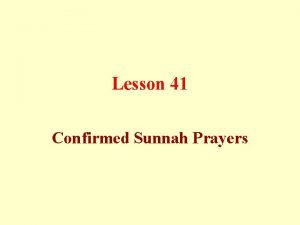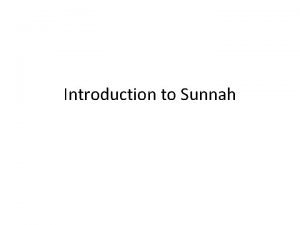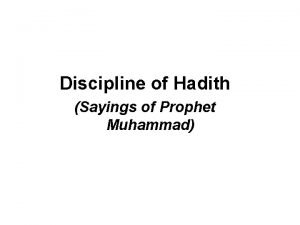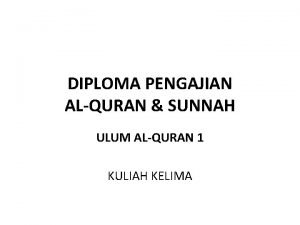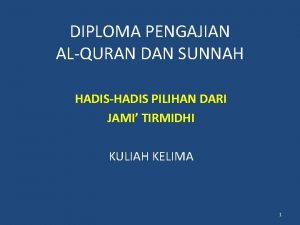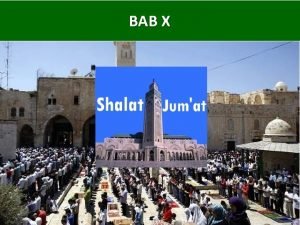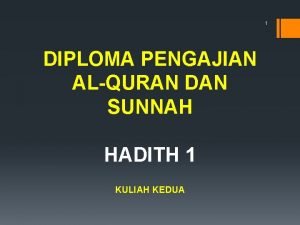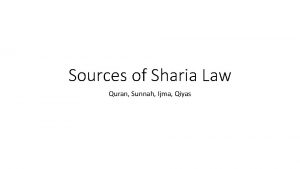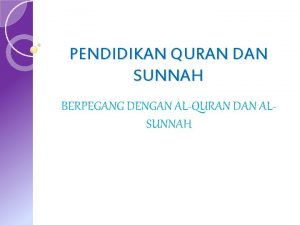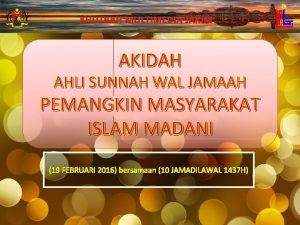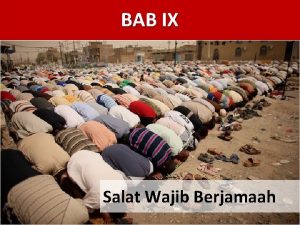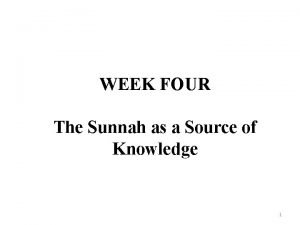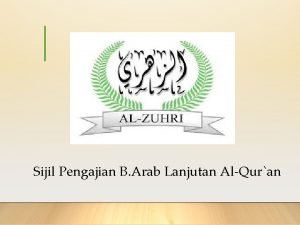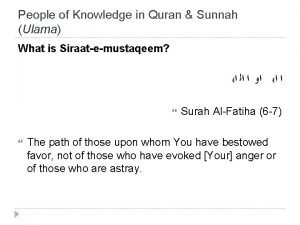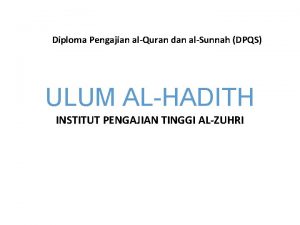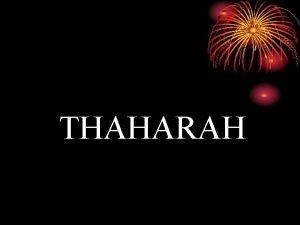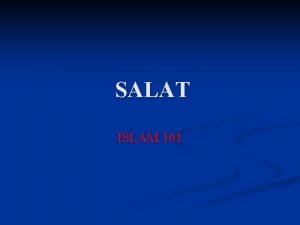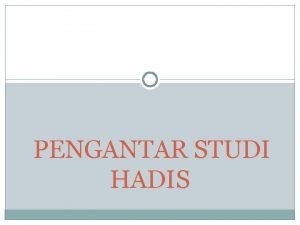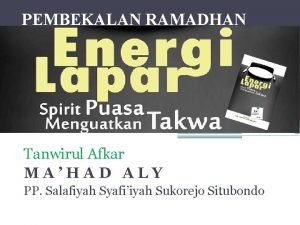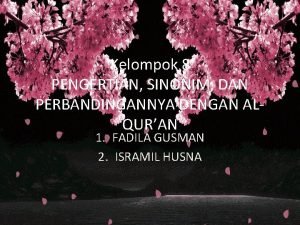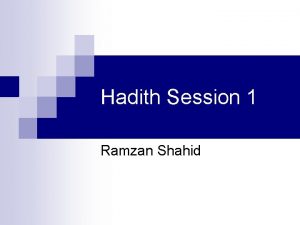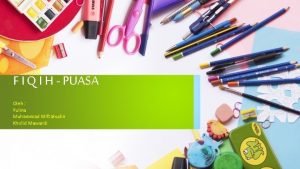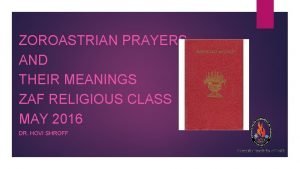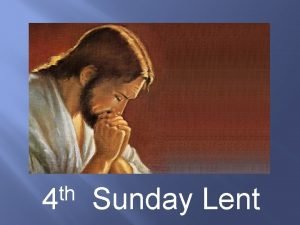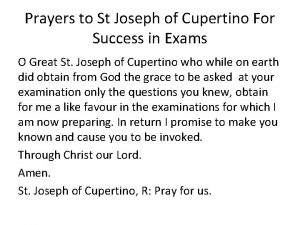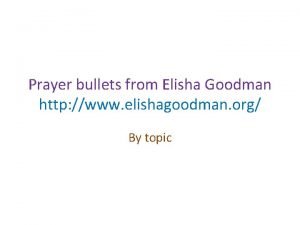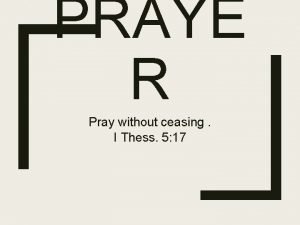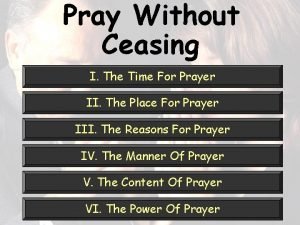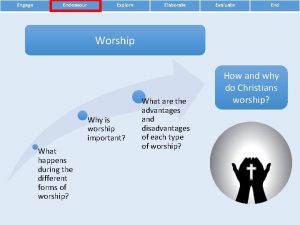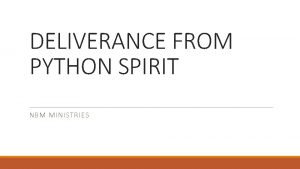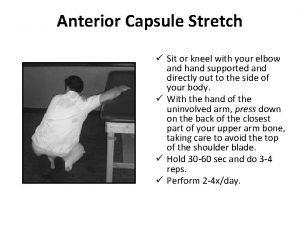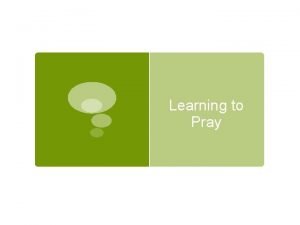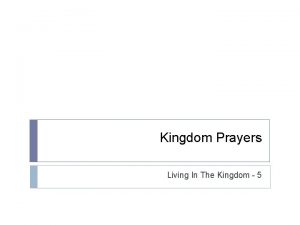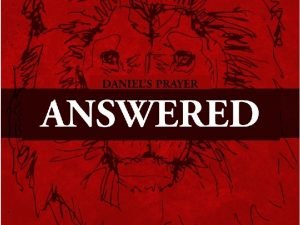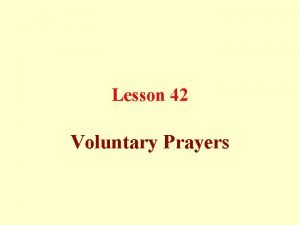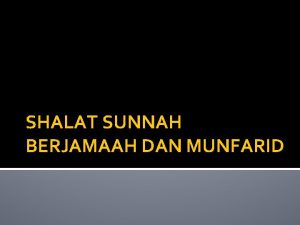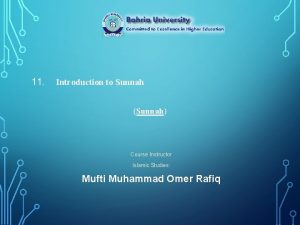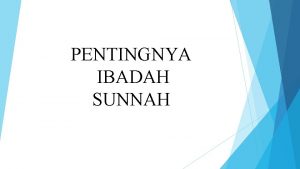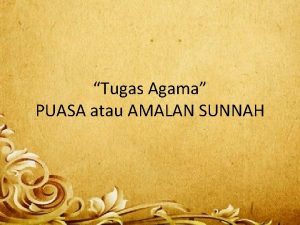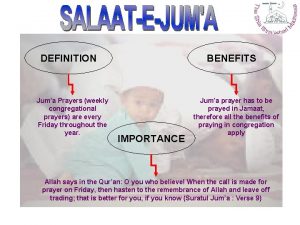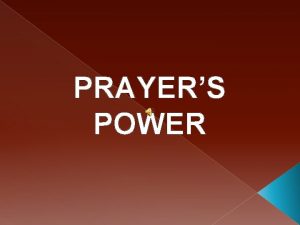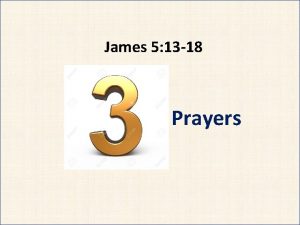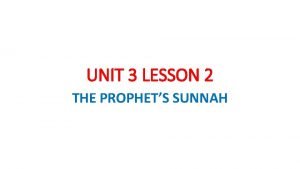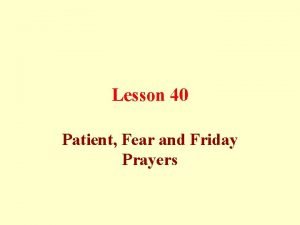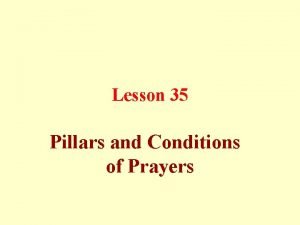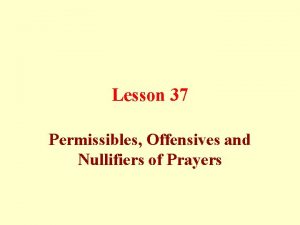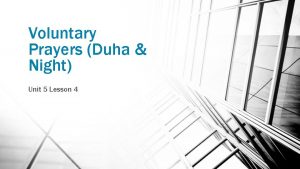Lesson 36 Sunnah of Prayers Sunnah of prayers































![Seeking the protection of Allah from Satan: Allah says: [98 : ]ﺍﻟﻨﺤﻞ ﴾ ﺍﻟ Seeking the protection of Allah from Satan: Allah says: [98 : ]ﺍﻟﻨﺤﻞ ﴾ ﺍﻟ](https://slidetodoc.com/presentation_image_h/3585229a89d073aa45973e247e697f78/image-32.jpg)

















- Slides: 49

Lesson 36 Sunnah of Prayers

Sunnah of prayers: It is confirmed (akin to the obligatory) or unconfirmed (like the recommended). The Schools of Jurisprudence disagree on some rules, but all are good.

Confirmed Sunnah of prayers: (a) Reciting some verses of the Qur’an after al-Fatihah in the two rak’ahs of dawn prayer, the first two of the noon, midafternoon, sunset, and evening prayers

Confirmed Sunnah of prayers: (b) Saying, when rising from bowing: “Sami`a Allahu Liman Hamidah, Rabbana Laka al. Hamd, ” that is, 'Allah listens to the one who praises Him, our Lord, for You is all Praise' (for the Imam, i. e. leader of a group, and for the individual prayer), and “Rabbana laka al. Hamd, ” that is, ‘Our Lord for You is all Praise’

Confirmed Sunnah of prayers: (c) Saying "Subhana Rabbiya al-`Adhim” (Praise to Our Lord the Ever. Magnificent) three times while bowing down, and: "Subhana Rabbiya al-A`la” (Praise be to Our Lord, the Most Exalted) three times while prostrating)

Confirmed Sunnah of prayers: (d) Saying Allahu Akbar when moving from one position to another except when standing upright after bowing.

Confirmed Sunnah of prayers: (e) Saying the first and second tashahhud while sitting

Confirmed Sunnah of prayers: (f) Raising the voice while reciting in the two rak`ahs of the dawn prayer, and the first two rak`ahs of the sunset and evening prayers (as in other prayers recitation is to be performed inwardly).

Confirmed Sunnah of prayers: (g) Offering the benediction on the Prophet (SAWS) in the tashahhud (testification of faith) as in the known formula.

Unconfirmed Sunnah of prayers: (a) Reciting a certain “opening” invocation at the beginning after entering the state of ritual consecration

Unconfirmed Sunnah of prayers: (b) Saying, “A`udhu Billahi Min Ash-Shaytan ir-Rajim” (I seek the protection of Allah from Satan" in the first rak`ah of prayer, and to say inwardly, “Bismillah ir. Rahman ir-Rahim” (In the Name of Allah) before every recitation.

Unconfirmed Sunnah of prayers: (c) Lifting the hands to shoulder level when saying "Allahu Akbar" before bowing and when standing upright, and at the beginning of the first two rak`ahs of prayer.

Unconfirmed Sunnah of prayers: (d) Saying, “Amin” after al-Fatihah

Unconfirmed Sunnah of prayers: (e) Elongating the Qur’anic recitation in the dawn prayer, shortening it in the mid-afternoon and sunset prayers and moderating it in the noon and evening prayers.

Unconfirmed Sunnah of prayers: (f) Reciting an invocation between the two prostrations.

Unconfirmed Sunnah of prayers: (g) Saying the invocation of Qunut (after standing upright before prostration or after the recitation in the second Rak`ah of the Dawn prayer, or in the Witr prayer

Unconfirmed Sunnah of prayers: (h) The way of sitting

Unconfirmed Sunnah of prayers: (i) Putting the two palms on the chest, the right on the left.

Unconfirmed Sunnah of prayers: (j) Saying an invocation in prostration and in the last tashahhud

Unconfirmed Sunnah of prayers: (k) Greeting the right side and then the left.

Unconfirmed Sunnah of prayers: (l) Invoking Allah and supplicating Him after greeting

Evidence from Qur’an and Sunnah

Confirmed Sunnahs of prayer: Reciting Qur’an: Abu-Qatadah (RA) narrated: “The Prophet (SAWS) used to recite al-Fatihah followed by another Surah in the first two rak`ahs of the prayer, and used to recite only al. Fatihah in the last two rak`ahs of the dhuhr (Noon) prayer. Sometimes a verse or so was audible. ” (Reported by al-Bukhariyy and Muslim)

Saying Sami`a Allahu Liman Hamidah (Allah listens to those who praise Him): : Abu-Hurayrah (RA) narrated: “On rising from bowing, he (the Prophet) said, ‘Sami`a Allahu Liman Hamidah, ’ and then while standing straight he used to say, ‘Rabbana Laka Al-Hamd’” (Reported by al-Bukhariyy and Muslim)

Abu-Hurayrah (RA) narrated: “When the Prophet (SAWS) said, ‘Sami`a Allahu Liman Hamidah, ’ (Allah heard him who praised Him), he would say, ‘Rabbana Wa Laka Al-Hamd’” (Reported by al-Bukhariyy and Muslim)

Praising Allah in bowing down and prostration: `Uqbah Ibn `Amir (may Allah be pleased with him) narrated: When the verse of ﺍﻳ ﺍ (74 : )ﺍﻟﻮﺍﻗﻌﺔ which means: “Then glorify with praises the Name of your Lord, the Most Great. ” (56, Al-Waqi`ah: 74) was revealed, the Prophet (SAWS) said, ‘Use it when bowing, ’. And when the verse which means: “Glorify the Name of your Lord, the Most High. ” (al-A`la: 1) was revealed, he said: ‘Use it when prostrating yourself. ’” (Reported by Ahmad and Abu-Dawud)

Tashahhud and its known formula: “At-Tahiyyatu Li-Lahi Was-Salawatu Wat. Tayyibatu. As-Salamu `Alayka Ay-Yuhan. Nabiyyu Wa Rahmatul-Lahi Wa Barakatuhu. As-Salamu `Alayna Wa `Ala `Ibadil-Lahi i. S-Salihina. Ash-Hadu Al-La Ilaha Illal-Lahu Wa Ash-Hadu Anna Muhammadan `Abduhu Wa Rasuluhu. ”

(Meaning: The adorations of the tongue, all good things, and acts of worship are due to Allah. Peace be upon you, Prophet, and Allah's Mercy and His Blessings. Peace be upon us and upon Allah's upright servants. I testify that there is no god but Allah, and I testify that Muhammad is His servant and Prophet). (Reported by al-Bukhariyy and Muslim)

Invoking prayers for the Prophet: “Allahumma Salli `Ala Muhammad Wa `Ala Ali Muhammad Kama Sallayta `Ala Ibrahim Wa `Ala Ali Ibrahim. Wa Barik `Ala Muhammad Wa `Ala ‘Ali Muhammad Kama Barakta `Ala Ibrahim Wa `Ala ‘Ali Ibrahim. Fil `Alamin. In-Naka Hamidun Majid. ”

(Meaning: Allah, bless Muhammad and Muhammad’s family as You blessed Ibrahim and Ibrahim’s family. You are indeed Praiseworthy and Glorious. Allah, bestow favors upon Muhammad and Muhammad’s family as You granted favors to Ibrahim and Ibrahim's family. Verily You are Praise worthy and Glorious). (Reported by al-Bukhariyy and Muslim)

Unconfirmed Sunnahs of prayer: The invocation at the beginning of prayer and its known formula: “Subhanak Allahumma Wa Bi Hamdika. Tabaraka Ismuka Wa Ta`ala Jadduka Wa La Ilaha Ghayruka” (Meaning: Glory be to You, O Allah, and praise be to You, and Blessed is Your Name, and Exalted is Your greatness, and there is no god but You”. (Reported by Muslim - arrested)
![Seeking the protection of Allah from Satan Allah says 98 ﺍﻟﻨﺤﻞ ﺍﻟ Seeking the protection of Allah from Satan: Allah says: [98 : ]ﺍﻟﻨﺤﻞ ﴾ ﺍﻟ](https://slidetodoc.com/presentation_image_h/3585229a89d073aa45973e247e697f78/image-32.jpg)
Seeking the protection of Allah from Satan: Allah says: [98 : ]ﺍﻟﻨﺤﻞ ﴾ ﺍﻟ ﻳ ﺍﻟ ﺍ ﺍﻟﻠ ﺍ ﺍآ ﴿ﺍ

This means: “So when you want to recite the Qur'an, seek refuge with Allah from Shaytan (Satan), the outcast (the cursed one). ” (An-Nahl: 98) (by saying: A`uthu billahi min ash-Shaytan ir-rajim)

Raising the two hands: Abu Hurayrah (may Allah be pleased with him) narrated: “When the Prophet of Allah (peace be upon him) uttered the Takbir (Allah is the Greatest) for prayer (at the beginning), he raised his hands opposite to his shoulders; and when he bowed, he did like that; and when he raised his head to prostrate, he did like that; and when he got up at the end of each Rak`ah, he did like that. ” (Reported by Abu Dawud)

Saying Aamin after reciting the Fatihah: Wa’il Ibn Hujr (RA) narrated: “When the Prophet of Allah (SAWS) recited the verse: (7 : )ﺍﻟﻔﺎﺗﺤﺔ ﺍﻟ ﺍﻳ ﻻ ﻳ ﺍﻟﻏﻭ ﻳ which means “Not the path of those who earned Your Anger nor of those who went astray. ” (al-Fatihah, 7) he would say Aamin; and raised his voice (while uttering this word). ” (Reported by Abu Dawud)

The Prophet (SAWS) said: “Say Aamen when the Imam says ‘Ghayril Maghdubi `Alayhim Wala Ad-Dalin’ (meaning: Not the path of those who earned Your Anger, nor of those who went astray); all the past sins of the person whose saying (of Aamin) coincides with that of the angels will be forgiven. ” (Reported by al-Bukhariyy)

The known formula of the invocation between the first prostration and the other: “Rabbi Ighfir Li Warhamni Wa`afini Wahdini Warzuqni” (Meaning: O Allah, forgive me, have mercy on me, guide me, heal me, and provide for me. ” (Reported by Abu-Dawud)

The formula of the invocation of Qunut: “O Allah, guide me among those You has guided, grant me security among those You have granted security, take me into Your charge among those You have taken into Your charge, bless me in what You have given, guard me from the evil of what You have decreed, for You decree, and nothing is decreed for You. He whom You support is not humbled. Blessed and Exalted are You, our Lord. ” (Reported by at-Tirmidhiyy)

The way of sitting: Abu-Hamid As-Sa`idi (RA) narrated: “On sitting in the second Rak`ah, he (the Prophet) sat on his left foot and propped up the right one; and in the last Rak`ah, he pushed his left foot forward and kept the other foot propped up and sat over the buttocks. ” (Reported by al-Bukhariyy)

The way of putting the two hands over each other: “When Ibn-Mas`ud prayed, he placed his left hand on the right. The Prophet (SAWS) saw him and placed his right hand on his left one. (Reported by al-Bukhariyy and Muslim)

Invocation in prostration: The Messenger of Allah (SAWS) said: “And see that I have been forbidden to recite the Qur’an in the state of bowing and prostrating. Glorify your Lord in bowing posture and exert yourself in supplication in prostration. Thus your supplications are liable to be accepted. ” (Reported by Muslim)

The known formula of the invocation that follows the last Tashahhud: “O Allah! I seek refuge in You from the torment of Hell, from the torment of the grave; from the trials of life and death and from the mischief of al-Masih ad. Dajjal; the antichrist. ” (Reported by Muslim)

Greeting the right side and the left one: `Abdullah Ibn-Mas`ud (RA) narrated: “The Prophet (SAWS) used to give the salutation to his left and right sides until the whiteness of his cheek was seen ”. (Reported by Muslim)

The supplication and remembrance of Allah after greeting: Thawban (RA) narrated: “When the Messenger of Allah (SAWS) accomplished his prayer, he begged forgiveness from Allah thrice and recited: ‘Allah, You are the Bestower of peace; and from You is peace; You are Blessed. O Lord of Grandeur and Honor!’” (Reported by an-Nasa’iyy)

and said: “If one recites after every prayer: Subhan Allah (Glory be to Allah) thirty three times; al-Hamdu Lillah (praise be to Allah) thirty three times; Allahu Akbar (Allah is the Greatest) thirty three times; and, in the hundredth, La ilaha illa Allah, wahdahu la sharika lahu, lahu Al-Mulk wa lahu Al-Hamd, wa Huwa ala kulli shay’in Qadir

(there is no god except Allah, the One, Who has no partner, to Him belongs the Sovereignty and the Praise and He has power over all things, ' he will have all his sins pardoned even though they may be as much as the foam of the sea. ” (Reported by Muslim)

Sa`d Ibn-Abi-Waqqas (RA) narrated: “The Messenger of Allah (SAWS) used to seek protection after the prescribed prayers with these expressions: ‘I seek refuge in You from cowardice and miserliness and from being brought to a state of frustration; and seek refuge in You from the turmoil of this life and that of the grave. ’” (Reported by al-Bukhariyy)

The Messenger of Allah (peace be upon him) said: “O Mu`adh! By Allah, I love you, and I advise you: You should never abandon reciting after every prayer: 'Allah, assist me in remembering You and being grateful to You and performing Your worship in an excellent manner. ’” (Reported by Abu Dawud and Ahmad)

Al-Mughirah Ibn Shu`bah (may Allah be pleased with him) narrated: “The Messenger of Allah (peace be upon him) used to supplicate at the end of each prescribed prayer: There is no god but Allah. He is Alone Who has no partner. To Him belongs the Sovereignty, to Him praise is due, and He is Potent over everything. O Allah! No one can withhold what You give, or give what You withhold, and the riches can not avail a wealthy person with You. ” (Reported by Al-Bukhari and Muslim)
 Sunnah prayers
Sunnah prayers Sunnah muakkad adalah
Sunnah muakkad adalah Peta konsep salat berjamaah
Peta konsep salat berjamaah Ilm masatalah means
Ilm masatalah means Discipline in quran and hadith
Discipline in quran and hadith Berikut yang tidak termasuk adab membaca alquran adalah
Berikut yang tidak termasuk adab membaca alquran adalah Tsuraiya
Tsuraiya The authority of sunnah
The authority of sunnah Diploma alquran dan sunnah
Diploma alquran dan sunnah Peta konsep shalat
Peta konsep shalat Diploma quran dan sunnah
Diploma quran dan sunnah Quran sunnah ijma qiyas
Quran sunnah ijma qiyas Dua keistimewaan al quran berbanding kitab samawi yang lain
Dua keistimewaan al quran berbanding kitab samawi yang lain Kesimpulan ahli sunnah wal jamaah
Kesimpulan ahli sunnah wal jamaah Peta konsep sholat wajib
Peta konsep sholat wajib Shalat rabbaniyah
Shalat rabbaniyah Diploma al quran dan sunnah
Diploma al quran dan sunnah Sunnah
Sunnah Diploma pengajian al quran dan sunnah separuh masa
Diploma pengajian al quran dan sunnah separuh masa Rukun tayammum
Rukun tayammum Atthayyato lillahe
Atthayyato lillahe Hari yang diharamkan untuk berpuasa adalah
Hari yang diharamkan untuk berpuasa adalah Persamaan hadis dan sunnah
Persamaan hadis dan sunnah Pengertian puasa sunnah
Pengertian puasa sunnah Pengertian wudhu
Pengertian wudhu Maksud dari taqriri adalah
Maksud dari taqriri adalah Jummah rakat
Jummah rakat N
N Rukun puasa
Rukun puasa Zoroastrian prayers in english
Zoroastrian prayers in english Prayers of saints revelation
Prayers of saints revelation Monday evening prayers
Monday evening prayers Pastafarianism holidays
Pastafarianism holidays Opening prayer for lent
Opening prayer for lent Saint joseph of cupertino prayer
Saint joseph of cupertino prayer Www.elishagoodman.org
Www.elishagoodman.org 5 kinds of prayer
5 kinds of prayer Pray without ceasing
Pray without ceasing Types of prayers
Types of prayers Python spirit in the bible
Python spirit in the bible Prayer for discipleship catholic
Prayer for discipleship catholic Lat prayers
Lat prayers Mark virkler heart attack
Mark virkler heart attack Praying for church leaders
Praying for church leaders Prayers for before a test
Prayers for before a test Tandorosti prayer
Tandorosti prayer Intercession prayer example
Intercession prayer example Kingdom prayers
Kingdom prayers Dharius daniels bloodline prayers
Dharius daniels bloodline prayers Rizal even jokingly called by his brothers and sisters,
Rizal even jokingly called by his brothers and sisters,
